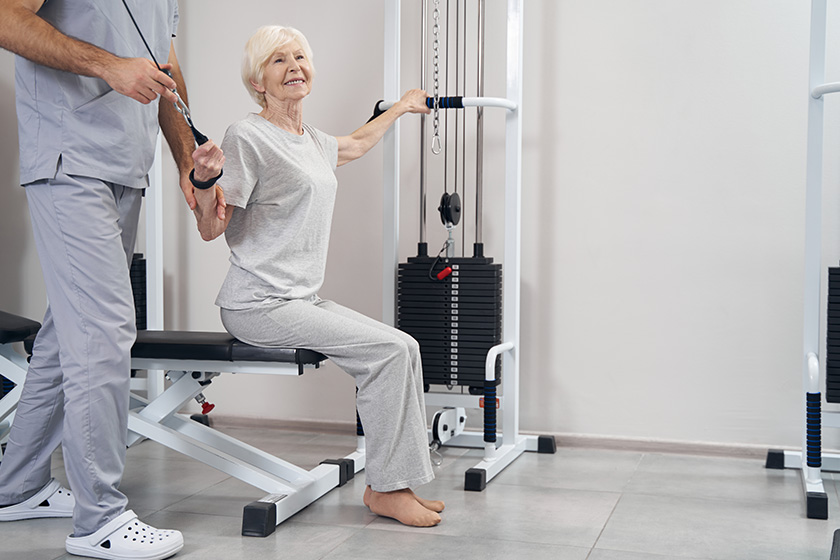If you or a loved one has experienced a stroke, you understand the significant impact it can have on one’s life, including physical challenges that may arise. However, with the right support and care, stroke survivors can lead fulfilling lives and regain their mobility. In Raleigh, NC, senior assisted care facilities offer innovative programs and personalized assistance to help residents who have had a stroke stay physically active.
- Individualized Exercise Plans
The core of senior assisted care’s approach to physical activity for stroke survivors lies in creating individualized exercise plans. These plans take into account the resident’s specific condition, strengths, and limitations. Physical therapists and caregivers work together to develop these plans, ensuring that they are safe, effective, and aligned with the resident’s recovery goals. The exercises may include a combination of stretching, strength training, and balance exercises, all aimed at improving overall physical function.
- Mobility Assistance and Walking Programs
Mobility assistance is a cornerstone of senior-assisted care. Residents receive one-on-one support to help them with activities like standing up, walking, and transitioning from one place to another. Walking programs are designed to gradually increase mobility and independence. Residents are encouraged to participate in regular walks, and the intensity is adjusted based on their progress. The goal is to enhance balance, coordination, and confidence in mobility, which are often affected by stroke.
- Physical Therapy Sessions
Physical therapy is a vital component of senior-assisted care for stroke survivors. Residents typically have scheduled sessions with experienced physical therapists. These sessions involve a range of exercises and techniques aimed at improving motor skills, fine and gross motor coordination, and muscle strength. Therapists work closely with residents to set achievable milestones and track their progress over time.
- Aquatic Therapy
Aquatic therapy is particularly beneficial for stroke survivors. It takes place in a pool where the buoyancy of the water reduces the impact on joints, making it a safe and effective option. During aquatic therapy, residents engage in exercises that focus on balance, flexibility, and strength. The resistance provided by water helps with muscle strengthening, while the supportive environment encourages confidence and mobility.
- Adaptive Equipment and Assistive Devices
Senior assisted care facilities are well-equipped with a variety of adaptive equipment and assistive devices. These tools are designed to make daily activities and exercises more manageable. Examples include walking aids, handrails, specialized exercise equipment, and mobility devices tailored to the individual’s needs. Caregivers guide on using these devices safely and effectively.
- Engaging in Recreational Activities
Beyond structured exercises, senior-assisted care encourages residents to engage in recreational activities that enjoyably promote physical activity. Gardening, dancing, painting, and other creative arts not only provide physical benefits but also contribute to emotional well-being. These activities are tailored to residents’ interests and abilities, ensuring a personalized and engaging experience.
- Nutritional Support
Proper nutrition is fundamental to recovery and overall health. Senior assisted care facilities provide residents with well-balanced meals designed to meet their specific dietary requirements. Nutritional support ensures that residents have the energy and nutrients needed for physical activity and recovery. Dieticians and caregivers monitor residents’ dietary needs and make adjustments as necessary.
- Continual Monitoring and Assessment
To ensure that residents are making progress in their physical activities, senior-assisted care facilities conduct regular monitoring and assessment. Caregivers and therapists observe residents’ mobility, strength, and coordination, adjusting exercise plans as needed. This ongoing assessment helps track improvements and set new goals for residents.
- Emotional and Psychological Support
Emotional well-being is closely tied to physical recovery. Senior assisted care teams provide emotional support and counseling to stroke survivors. Encouragement and motivation play a vital role in helping residents stay committed to their physical activity routines. Supportive caregivers and therapists build rapport with residents, creating a positive environment that fosters physical and emotional healing.
Empowering Stroke Survivors
Living an active and fulfilling life after a stroke is possible with the support of senior-assisted care. These facilities are committed to helping stroke survivors regain their physical abilities, independence, and confidence. By providing individualized exercise plans, access to physical therapy, engaging recreational activities, and emotional support, they create an environment where residents can thrive.
We have several residential living options in Raleigh, NC that provide various exclusive programs to keep you happy and healthy. If you or a loved one has experienced a stroke, consider the empowering opportunities that senior assisted care facilities in Raleigh, NC, can offer. With our innovative programs and personalized care, we are dedicated to helping stroke survivors on the path to physical recovery and a brighter future.







